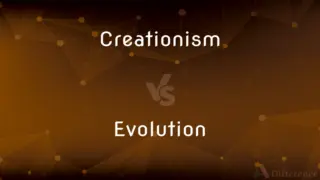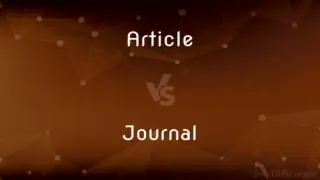Declamation vs. Elocution — What's the Difference?
By Tayyaba Rehman & Maham Liaqat — Updated on March 3, 2024
Declamation focuses on delivering a speech with strong emotions and conviction, while elocution emphasizes clear and expressive speech delivery.

Difference Between Declamation and Elocution
Table of Contents
ADVERTISEMENT
Key Differences
Declamation is the art of delivering speeches with powerful emotions and persuasive force, aiming to captivate and move the audience. It involves reciting speeches or literary works with emphasis on intonation, gesture, and expressiveness to convey deep feelings or to persuade. Elocution, on the other hand, focuses on the technique of clear and expressive speech, especially to avoid defects of speech or pronunciation. It covers aspects like tone, pitch, volume, and articulation, aiming for effective communication.
While declamation is often associated with dramatic or rhetorical speech aiming to convince or inspire, elocution pays closer attention to the physical aspects of speech delivery. This includes pronunciation, breath control, and the physical articulation of sounds. Elocution skills are crucial for effective public speaking but are also applied in everyday communication to enhance clarity and impact.
Declamation is traditionally seen in educational settings as a tool for teaching public speaking and performance, often involving students reciting famous speeches or passages. This practice develops confidence, public speaking skills, and emotional expression. Elocution, however, might be part of a broader curriculum that includes voice training, diction, and sometimes corrective speech therapy, focusing on the mechanics of speech.
The choice of material and the speaker’s ability to interpret and emotionally connect with it are paramount. The emphasis is on emotional engagement and the power of the content. Elocution concerns itself more with how speech sounds and is understood, prioritizing clarity, and effectiveness of delivery over the emotional weight of the content.
Declamation and elocution both play significant roles in the development of effective communication skills but approach this goal from different angles. Declamation enhances emotional expressiveness and persuasive power, while elocution focuses on clear, articulate, and physically grounded speech delivery.
ADVERTISEMENT
Comparison Chart
Focus
Emotional delivery and persuasion
Clear and expressive speech delivery
Key Elements
Emotion, intonation, gesture
Pronunciation, articulation, breath control
Purpose
To captivate and move the audience
To enhance speech clarity and effectiveness
Setting
Educational, public speaking
Educational, therapeutic, everyday communication
Emphasis
Content’s emotional weight
Mechanics of speech
Compare with Definitions
Declamation
The act of delivering a speech with fervor and passion.
The student's declamation of Lincoln's Gettysburg Address stirred the audience.
Elocution
Training in the field of effective oral delivery.
He took elocution classes to polish his public speaking skills.
Declamation
Public speaking with emphasis on emotion and persuasion.
His declamation on environmental issues captured everyone's attention.
Elocution
Techniques for improving speech clarity and impact.
Elocution involves exercises for breath control and vocal variety.
Declamation
The practice of reciting a piece with expressive force.
Declamation requires understanding the emotional depth of the piece.
Elocution
A focus on pronunciation, tone, and articulation.
Her elocution was impeccable, making every word clear.
Declamation
A method to teach oratory and performance skills.
Declamation in class helps students improve their public speaking abilities.
Elocution
Practice aimed at correcting speech defects.
Elocution therapy helped him overcome his stutter.
Declamation
A rhetorical exercise of reciting speeches.
Declamation competitions encourage students to express emotions vividly.
Elocution
The art of clear and expressive speech.
Elocution lessons improved her pronunciation and confidence.
Declamation
Declamation (from the Latin: declamatio) is an artistic form of public speaking. It is a dramatic oration designed to express through articulation, emphasis and gesture the full sense of the text being conveyed.
Elocution
Elocution is the study of formal speaking in pronunciation, grammar, style, and tone as well as the idea and practice of effective speech and its forms. It stems from the idea that while communication is symbolic, sounds are final and compelling.
Declamation
The action or art of declaiming
Declamations of patriotism
Shakespearean declamation
Elocution
The skill of clear and expressive speech, especially of distinct pronunciation and articulation
Lessons in singing and elocution
Declamation
The public recitation of speeches as an exercise in schools and colleges.
Elocution
The art of public speaking in which gesture, vocal production, and delivery are emphasized.
Declamation
The act or art of declaiming; rhetorical delivery; haranguing; loud speaking in public; especially, the public recitation of speeches as an exercise in schools and colleges; as, the practice declamation by students.
The public listened with little emotion, but with much civility, to five acts of monotonous declamation.
Elocution
A style or manner of speaking, especially in public.
Declamation
Pretentious rhetorical display, with more sound than sense; as, mere declamation.
Elocution
The art of public speaking with expert control of gesture and voice, etc.
Declamation
Recitation of a speech from memory with studied gestures and intonation as an exercise in elocution or rhetoric
Elocution
Oratorical or expressive delivery, including the graces of intonation, gesture, etc.; style or manner of speaking or reading in public; as, clear, impressive elocution.
Elocution
Suitable and impressive writing or style; eloquent diction.
To express these thoughts with elocution.
Elocution
An expert manner of speaking involving control of voice and gesture
Common Curiosities
What is elocution?
Elocution focuses on the art of clear and expressive speech delivery, emphasizing pronunciation, articulation, and effective communication.
How do declamation and elocution differ in focus?
Declamation focuses on emotional delivery and persuasion, whereas elocution emphasizes speech clarity and expressiveness.
What is declamation?
Declamation is the act of delivering speeches or literary works with emphasis on emotional expression and persuasion.
Who can benefit from elocution?
Individuals looking to correct speech defects, improve communication skills, or enhance public speaking clarity.
Can declamation and elocution skills overlap?
Yes, both skill sets can complement each other, enhancing overall communication effectiveness.
How does declamation enhance emotional expression?
By focusing on intonation, gesture, and expressiveness to convey feelings or persuade.
Why is declamation important?
It develops confidence, emotional expressiveness, and public speaking skills.
How does elocution enhance speech delivery?
Through techniques that improve pronunciation, articulation, and breath control.
Is declamation only for dramatic speeches?
While often dramatic, declamation can apply to any speech aiming to inspire or persuade.
How are declamation and elocution taught?
Through practice, feedback, and exercises focusing on their respective elements.
Why is elocution important?
Elocution improves speech clarity, pronunciation, and the physical delivery of speech.
Who can benefit from declamation?
Students, public speakers, and anyone looking to improve their oratory and performance skills.
Do declamation and elocution require professional training?
Not necessarily, but training can significantly enhance skills in both areas.
Can elocution correct stuttering?
Yes, elocution therapy can be part of a treatment plan for stuttering and other speech disorders.
Can elocution help with everyday communication?
Yes, elocution techniques improve clarity and effectiveness in daily interactions.
Share Your Discovery

Previous Comparison
Commander vs. Brawl
Next Comparison
Toluol vs. TolueneAuthor Spotlight
Written by
Tayyaba RehmanTayyaba Rehman is a distinguished writer, currently serving as a primary contributor to askdifference.com. As a researcher in semantics and etymology, Tayyaba's passion for the complexity of languages and their distinctions has found a perfect home on the platform. Tayyaba delves into the intricacies of language, distinguishing between commonly confused words and phrases, thereby providing clarity for readers worldwide.
Co-written by
Maham Liaqat














































